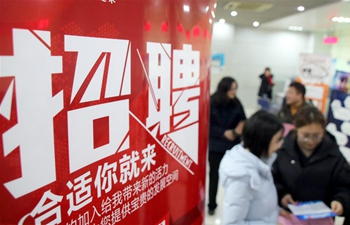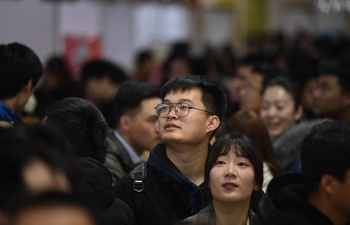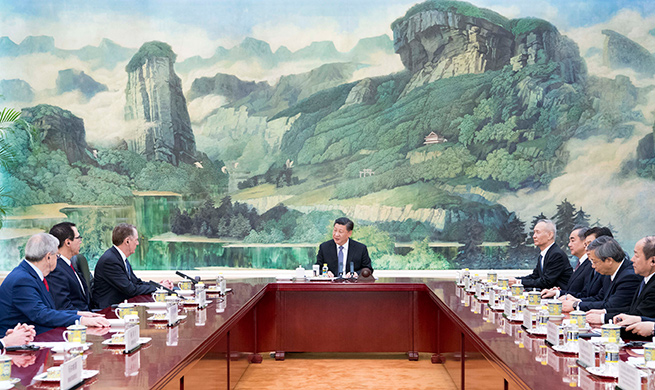STRASBOURG, Feb. 15 (Xinhua) -- In a plenary session dominated by trade and security, the European Parliament moved this week to back tighter screening of foreign investments, proposals for revamped copyright law, and free trade with Singapore in Strasbourg.
In comparison to past plenary sessions centered on crisis management, the week showed a European Parliament seeking to protect EU interests, to balance digital markets, and to establish frameworks to open up and protect trade with global partners.
Scrutinizing foreign investment
The European Parliament gave the greenlight Thursday to a new EU-wide tool for screening investment, specifically inward foreign direct investment (FDI), leaving the EU open to foreign investors but increasing scrutiny with the aim to limit any possible danger for the union's strategic interests.
This is the first EU-wide system for the screening of FDI by member states on the basis of security and public order, and will protect critical infrastructure such as energy, transport and communications.
A cooperation mechanism is included in the FDI measures to allow for the exchange of information between member states, which can comment on FDI targeting other member states. The European Commission will also be given the power to ask for information and to deliver its opinion in the country where the investment is planned, but final decisions will be made in the country concerned.
The FDI screening mechanism is set to be formally endorsed by the European Council on March 5, 2019 and will enter into force 18 months after its publication in the EU Official Journal.
New copyright directive set for vote
An agreement was also reached Thursday between European Parliament and European Council negotiators on a revamp of digital copyright rules, setting forward the new copyright directive to be voted on by members of the European Parliament (MEPs) in an upcoming plenary session.
The new copyright directive would give artists, journalists and other content-producers better bargaining power with major internet platforms such as Youtube, Facebook and Google News, with new requirements for revenue sharing, especially in cases where original agreed upon remuneration is disproportionately low compared to the gains achieved by the distributor.
Works uploaded to non-commercial online encyclopedias, like Wikipedia, or open source software platforms, like GitHub, will be excluded automatically from the directive. Start-up platforms will also be subject to lighter obligations.
The copyright directive, which has stoked controversy online among internet users afraid it would stifle creativity and expression, would still allow for the uploading of GIFs and memes to be protected. The uploading of protected works for the purposes of quotation, criticism, review, caricature, parody or pastiche would be permitted by the new framework.
Free trade deal with Singapore
MEPs also backed Wednesday a free trade deal with Singapore, the first such agreement with a member of the Association of Southeast Asian Nations (ASEAN), providing a potential blueprint for additional deals of its kind in the region. The EU-Singapore trade deal will eliminate almost all trade tariffs between the parties within five years, while enshrining increased protections on labor rights and environmental protection.
The deal will protect unique regional EU products, such as Jerez wine or Nurnberger Bratwurst, and also open up the Singaporean procurement market to EU firms working in, for example, the rail sector. Free trade will also include services, such as retail banking.
The European Council must approve the agreement formally, and then it will enter into force on the first day of the second month after it is concluded. Separate agreements on investment protection and partnership and cooperation will need to be ratified by member states in order to enter into force.
Singapore is the European Union's 14th-largest trade partner in goods, according to the European Commission, and over 10,000 European companies have their regional offices in the small country.













